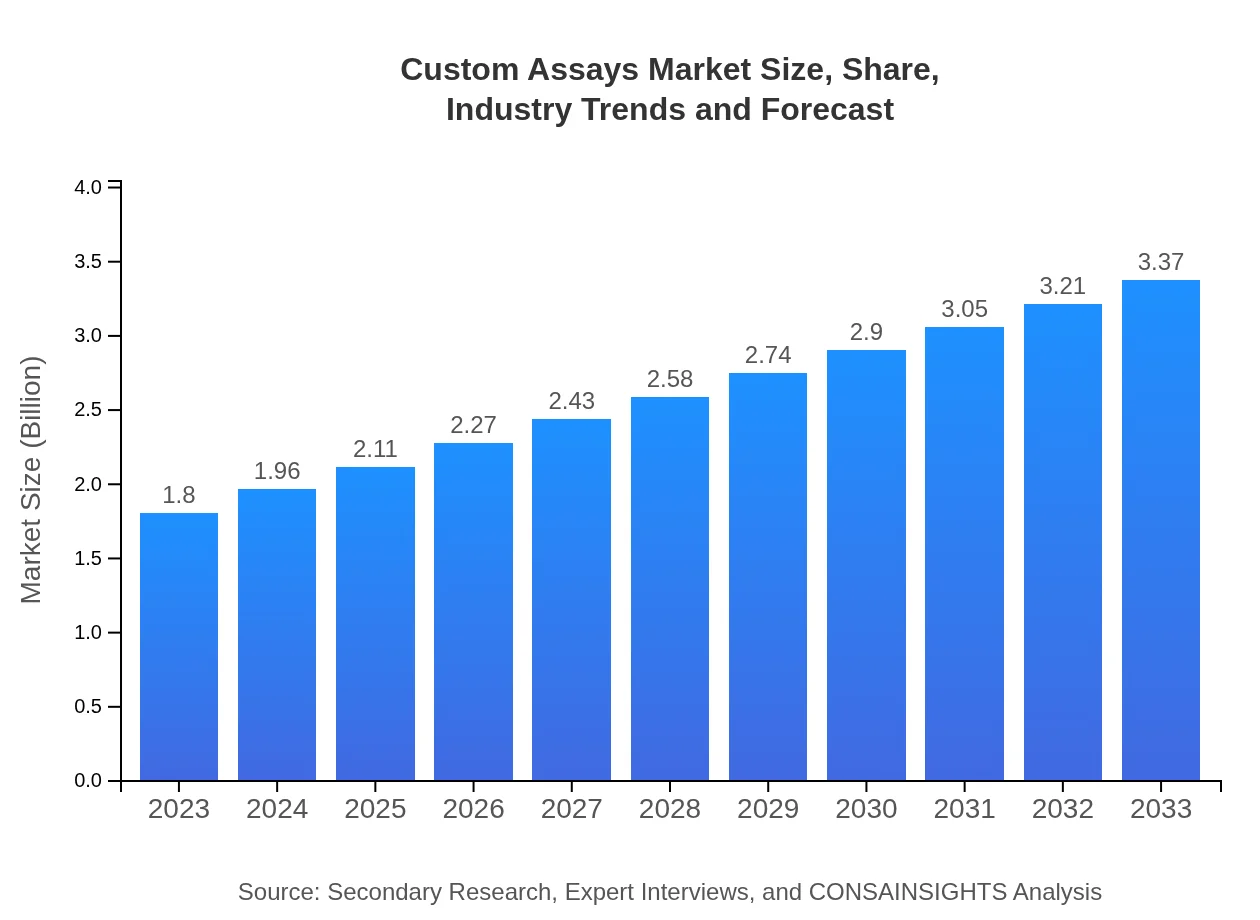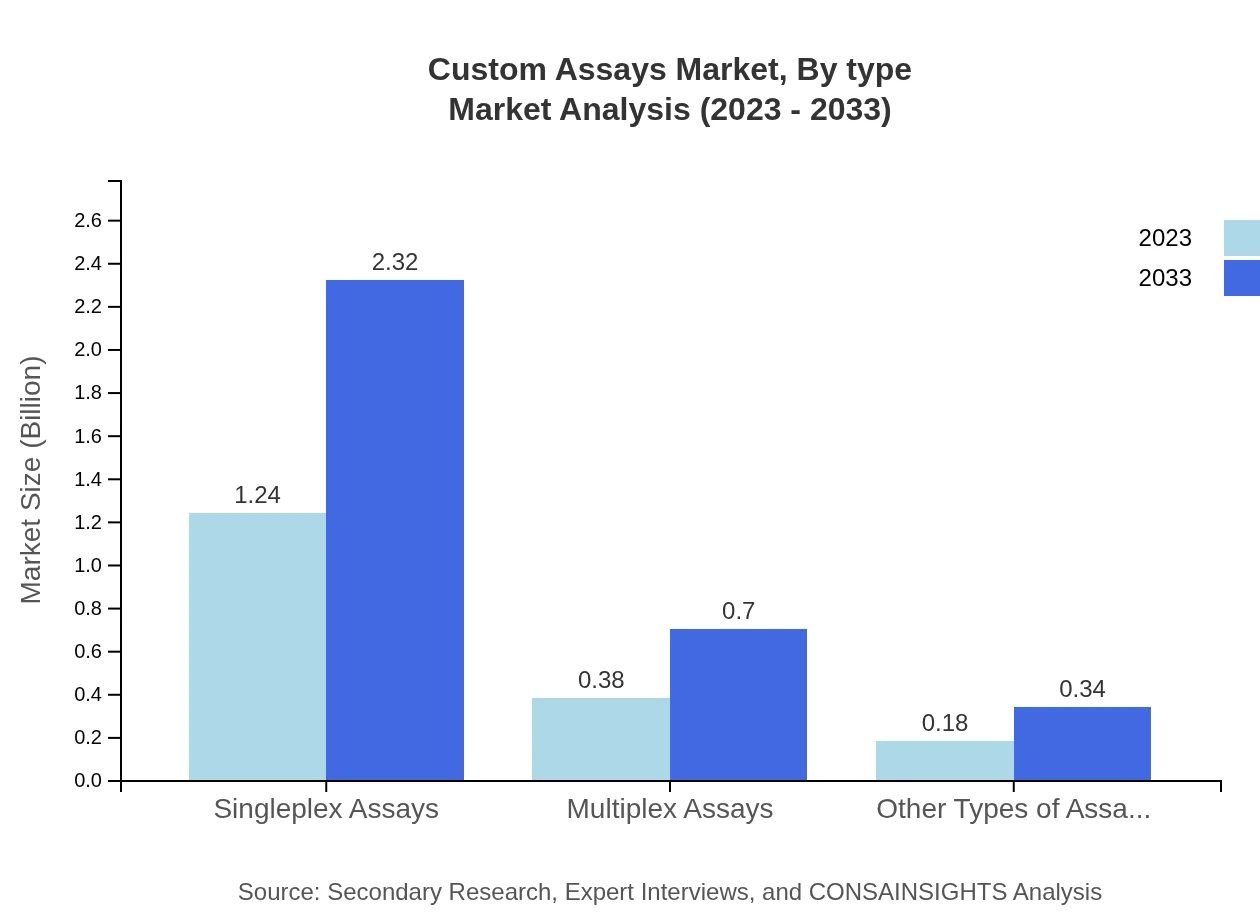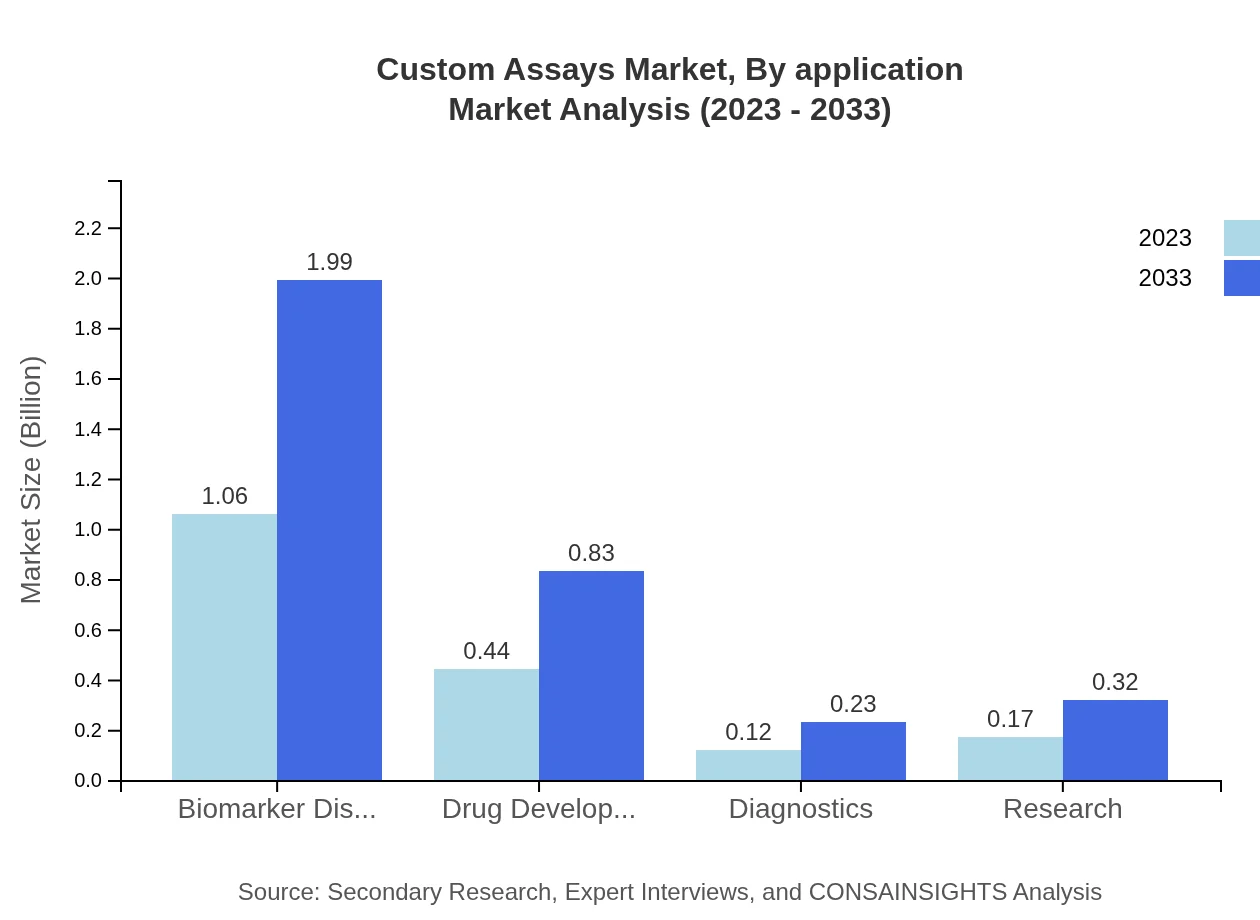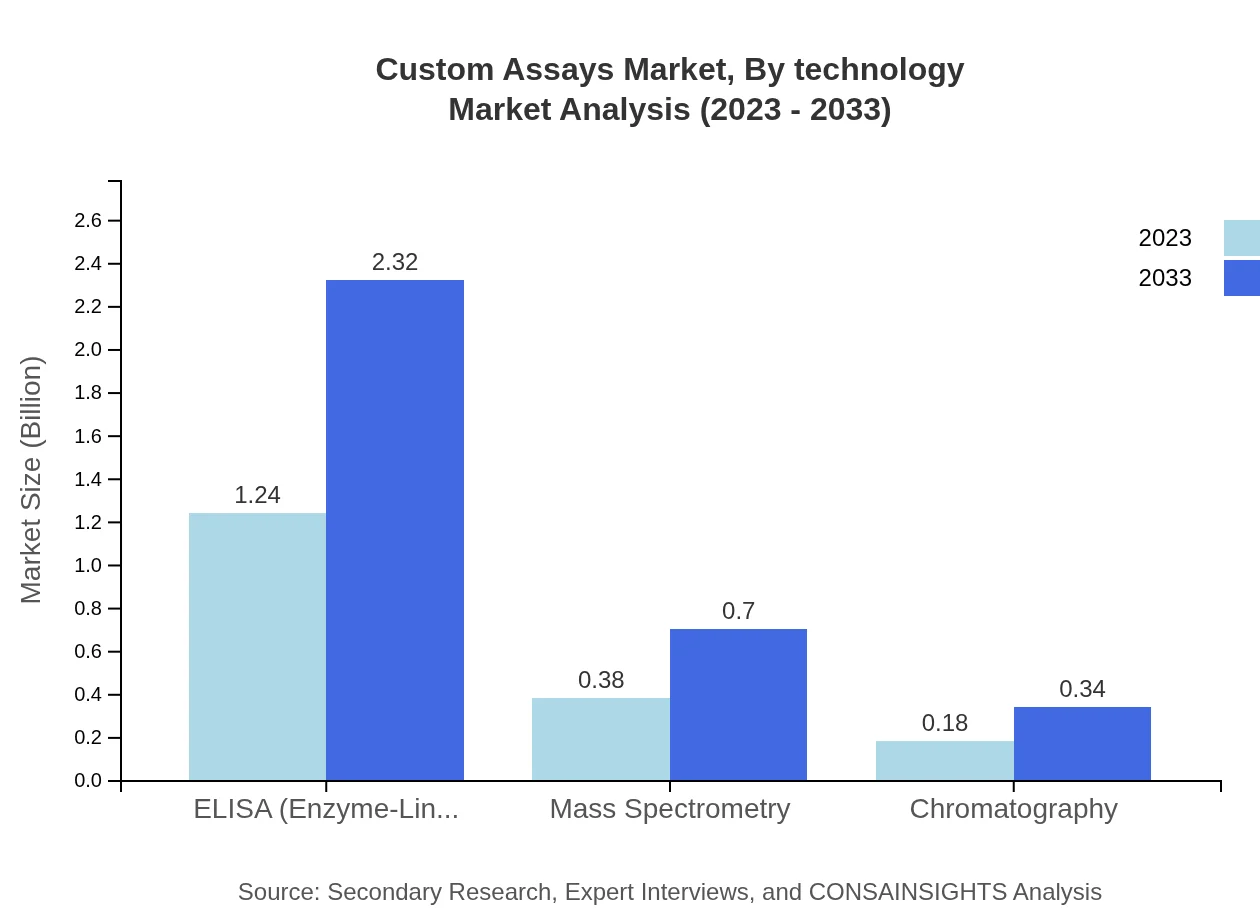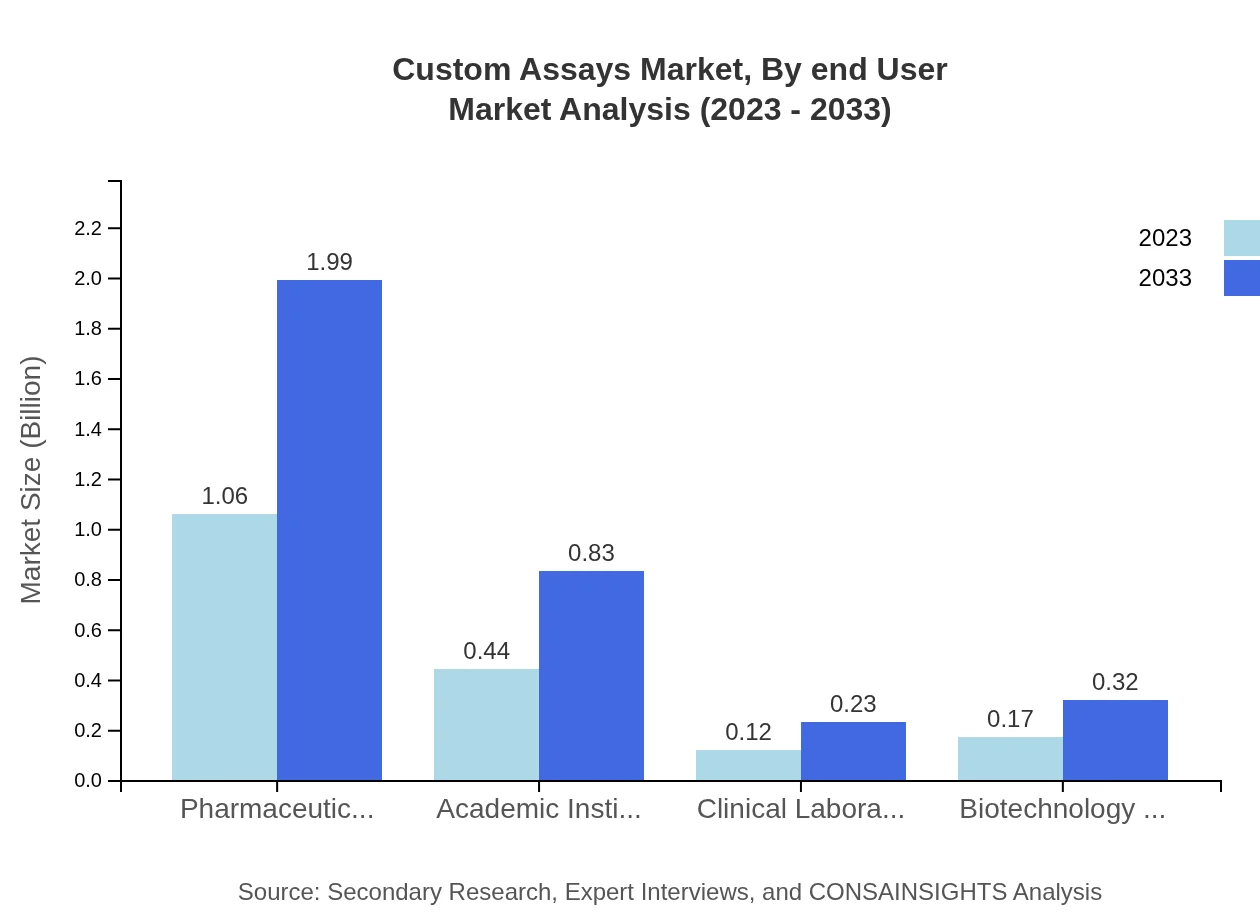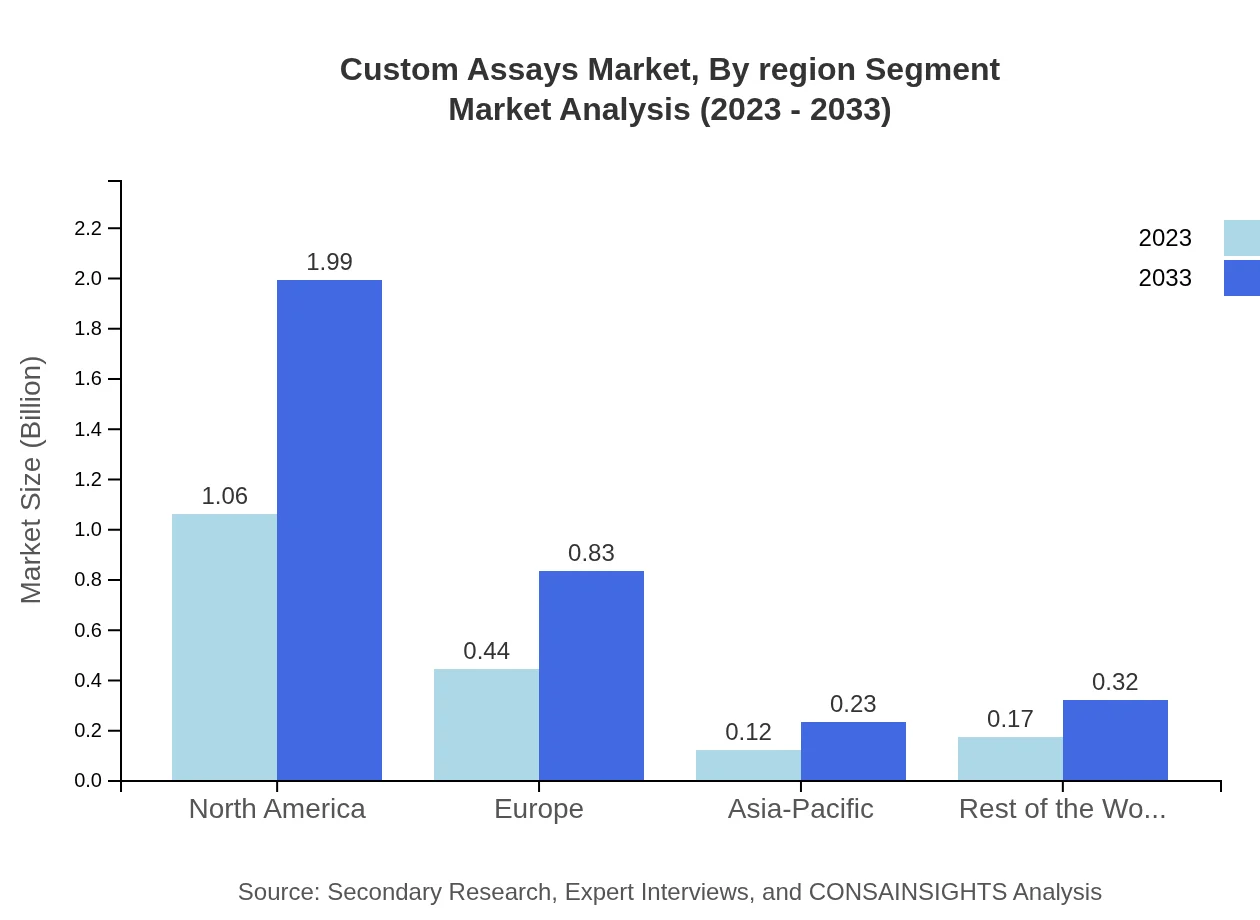Custom Assays Market Report
Published Date: 31 January 2026 | Report Code: custom-assays
Custom Assays Market Size, Share, Industry Trends and Forecast to 2033
This report provides an in-depth analysis of the Custom Assays market, exploring its growth potential, market drivers, regional insights, and future trends forecasting growth from 2023 to 2033.
| Metric | Value |
|---|---|
| Study Period | 2023 - 2033 |
| 2023 Market Size | $1.80 Billion |
| CAGR (2023-2033) | 6.3% |
| 2033 Market Size | $3.37 Billion |
| Top Companies | Thermo Fisher Scientific, Abbott Laboratories, Roche Diagnostics, Bio-Rad Laboratories |
| Last Modified Date | 31 January 2026 |
Custom Assays Market Overview
Customize Custom Assays Market Report market research report
- ✔ Get in-depth analysis of Custom Assays market size, growth, and forecasts.
- ✔ Understand Custom Assays's regional dynamics and industry-specific trends.
- ✔ Identify potential applications, end-user demand, and growth segments in Custom Assays
What is the Market Size & CAGR of Custom Assays market in 2023?
Custom Assays Industry Analysis
Custom Assays Market Segmentation and Scope
Tell us your focus area and get a customized research report.
Custom Assays Market Analysis Report by Region
Europe Custom Assays Market Report:
The European market for Custom Assays is projected to increase significantly, from $0.58 billion in 2023 to $1.08 billion in 2033. Factors contributing to this growth include robust regulatory frameworks and an emphasis on precision medicine across nations in the EU.Asia Pacific Custom Assays Market Report:
In the Asia-Pacific region, the Custom Assays market is anticipated to expand from $0.35 billion in 2023 to $0.65 billion in 2033. The growth is primarily driven by increasing investments in healthcare and biotechnology, alongside the rising trend of personalized medicine in countries like China and India.North America Custom Assays Market Report:
North America remains a dominant player in the Custom Assays market, expected to grow from $0.61 billion in 2023 to $1.14 billion by 2033. The region's growth is fueled by strong R&D investments, an advanced healthcare infrastructure, and a high prevalence of chronic diseases, necessitating more personalized diagnostic tools.South America Custom Assays Market Report:
The South American market, though smaller, shows promise with projections rising from $0.15 billion in 2023 to $0.28 billion by 2033. This growth is attributed to increased healthcare spending and the burgeoning pharmaceutical sector in Brazil and Argentina.Middle East & Africa Custom Assays Market Report:
The Middle East and Africa market is poised for growth, from $0.12 billion in 2023 to $0.23 billion in 2033. Increasing investment in healthcare and research infrastructure, particularly in the UAE and South Africa, is driving market expansion.Tell us your focus area and get a customized research report.
Custom Assays Market Analysis By Type
The analysis underscores the prominence of Singleplex Assays, projected to grow from $1.24 billion in 2023 to $2.32 billion in 2033, thereby maintaining a market share of 68.9%. Meanwhile, Multiplex Assays are gaining traction, expected to increase from $0.38 billion to $0.70 billion, capturing a 20.91% market share by 2033. Other Assays, including advanced formats, will also see growth, with an increase from $0.18 billion to $0.34 billion and a steady share of 10.19%.
Custom Assays Market Analysis By Application
The Pharmaceutical Industry leads in market size, growing from $1.06 billion in 2023 to $1.99 billion by 2033, accounting for 58.95% of the share. Academic institutions and biotechnology firms hold significant portions too, with values of $0.44 billion and $0.17 billion, respectively, showcasing the utility of custom assays in diverse applications from drug discovery to academic research.
Custom Assays Market Analysis By Technology
ELISA technology dominates the Custom Assays market, expected to increase from $1.24 billion to $2.32 billion by 2033, maintaining a considerable 68.9% market share. Mass Spectrometry and Chromatography technologies are also noteworthy, estimated to rise from $0.38 billion to $0.70 billion and $0.18 billion to $0.34 billion, respectively.
Custom Assays Market Analysis By End User
North American end-users represent the largest segment, expected to see growth from $1.06 billion to $1.99 billion by 2033. The pharmaceutical sector remains substantially involved, followed by clinical laboratories that are expanding their testing capabilities. Academic institutions also play a vital role in the market, facilitating research and clinical studies.
Custom Assays Market Analysis By Region Segment
Regionally, North America leads, followed closely by Europe and Asia-Pacific, as they exhibit greater adoption rates and advanced infrastructures. The dynamics and growth potential within these regions reflect the global push towards enhanced diagnostic capabilities through Custom Assays.
Custom Assays Market Trends and Future Forecast
Tell us your focus area and get a customized research report.
Global Market Leaders and Top Companies in Custom Assays Industry
Thermo Fisher Scientific:
A leading provider of laboratory equipment and reagents, Thermo Fisher Scientific offers a wide range of custom assays designed for various scientific applications, enhancing research efficiency.Abbott Laboratories:
Abbott is at the forefront of diagnostics, supplying innovative assay technologies that are vital for clinical diagnoses and drug development processes.Roche Diagnostics:
Roche specializes in personalized diagnostics, providing custom assays that aid in disease management and research within the biotechnology and pharmaceutical industries.Bio-Rad Laboratories:
Bio-Rad is known for its extensive portfolio in life science research, supplying custom assay solutions that advance the understanding of human health and disease.We're grateful to work with incredible clients.









FAQs
What is the market size of Custom Assays?
The custom assays market is projected to reach approximately $1.8 Billion by 2033, growing at a CAGR of 6.3% from 2023 to 2033. This indicates a significant expansion, driven by increasing demand in various sectors.
What are the key market players or companies in the Custom Assays industry?
Leading players in the custom assays space include major biotechnology firms, pharmaceutical companies, and academic institutions known for research and diagnostic innovations. Notable names often collaborate on R&D to enhance assay accuracy and efficiency.
What are the primary factors driving the growth in the Custom Assays industry?
Key drivers include the rising demand for personalized medicine, advances in biotechnology, increased funding for drug development, and the growing need for diagnostic tools. These factors collectively promote innovation and application in the healthcare sector.
Which region is the fastest Growing in the Custom Assays?
North America leads in market growth, with projected revenue rising from $0.61 Billion in 2023 to $1.14 Billion by 2033. Europe and Asia Pacific also show significant growth, indicating wider adoption of custom assays in these regions.
Does ConsaInsights provide customized market report data for the Custom Assays industry?
Yes, ConsaInsights offers customized market reports tailored to specific requirements in the custom assays industry. Clients can access comprehensive data, including trends, forecasts, and competitive analysis tailored to their interests.
What deliverables can I expect from this Custom Assays market research project?
Deliverables include in-depth market analysis reports, projected growth rates, detailed competitive analysis, and data segmented by region and application types, providing a holistic view of the market landscape.
What are the market trends of Custom Assays?
Current trends include a shift towards multiplex assays, increased integration of automation in laboratories, and technological advancements in assay development. These trends highlight a move towards efficiency and precision in testing methodologies.

